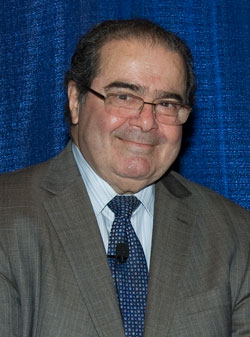Textual Originalism and the Great Sandwich Debate: Posner Reviews Scalia

Photo of U.S. Supreme Court Justice Antonin
Scalia courtesy of ABA Media Services.
Judge Richard Posner picks apart Justice Antonin Scalia’s arguments for textualism in a book review that touches on the meaning of “sandwich” and the role of cognitive delusion in judicial decision-making.
Scalia’s defense of “textual originalism” is lacking, Posner concludes in the New Republic essay. Scalia’s method relies on dictionary definitions and historical analysis, but they don’t necessarily provide definitive answers to questions of statutory and constitutional interpretation, Posner writes in a review of Reading Law: The Interpretation of Legal Texts. Scalia and Bryan Garner are co-authors.
“Judges are not competent historians,” says Posner, of the Chicago-based 7th U.S. Circuit Court of Appeals. “Even real historiography is frequently indeterminate, as real historians acknowledge. To put to a judge a question that he cannot answer is to evoke ‘motivated thinking,’ the form of cognitive delusion that consists of credulously accepting the evidence that supports a preconception and of peremptorily rejecting the evidence that contradicts it.”
In Posner’s view, the 57 “canons of construction” outlined in Scalia and Garner’s book “provide them with all the room needed to generate the outcome that favors Justice Scalia’s strongly felt views on such matters as abortion, homosexuality, illegal immigration, states’ rights, the death penalty, and guns.”
Posner also sees problems with heavy reliance on dictionary definitions, and refers to a case included in the book on the meaning of “sandwich” to illustrate. At issue in the case, White City Shopping Center v. PR Restaurant, was the meaning of a lease for a shopping center sandwich shop that promised no other leases would be given to stores that sold primarily sandwiches. The shopping center leased to a restaurant that would sell burritos, tacos, and quesadillas.
The court ruled that the second lease was allowed based partly on a dictionary definition that defined “sandwich” as “two thin pieces of bread, usually buttered, with a thin layer (as of meat, cheese, or savory mixture) spread between them.”
“As is often the case, the court got the definition wrong,” Posner writes. “A sandwich does not have to have two slices of bread; it can have more than two (a club sandwich) and it can have just one (an open-faced sandwich). The slices of bread do not have to be thin, and the layer between them does not have to be thin either. The slices do not have to be slices of bread: a hamburger is regarded as a sandwich, and also a hot dog—and some people regard tacos and burritos as sandwiches, and a quesadilla is even more sandwich-like. Dictionaries are mazes in which judges are soon lost. A dictionary-centered textualism is hopeless.”
George Mason University law professor David Bernstein picks up the sandwich debate in a post at the Volokh Conspiracy. “In my experience, ‘sandwich shops’ like Corner Bakery don’t sell hamburgers,” Bernstein writes, “and I’d be very surprised if someone offered me a sandwich and then handed me a hamburger. I’d be even more surprised to be offered a hot dog. Tacos, burritos, and quesadillas seem even further removed from what I think of as a ‘sandwich.’ ”
Prior coverage:
ABA Journal: “Scalia and Garner Release 567-Page Tome on Textualism”



